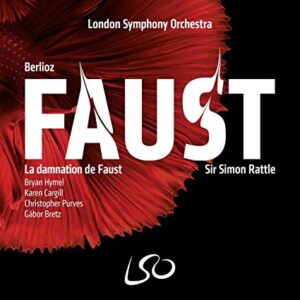It had been a long time between listens to Berlioz’s one-of-a-kind La damnation de Faust, and the very opening seconds caught my attention in a new way: It begins with the aging Dr. Faust’s reflecting on life, with from-nowhere viola phrases both aching and nostalgic. We are in medias res—no background, no prior information, and in a way, with no way out. It’s as captivating and odd as it is beautiful. Flutes appear from nowhere and the long viola melody begins to chug. Peasants and the military are suggested in the distance; they arrive and Faust is unaffected by them. Despite the jollity of the peasants, the mood remains pensive and somber; we are in Faust’s mind-set. The raucous, boastful Hungarian march that ends Part 1 is phenomenally played. Faust is next seen and heard in his study, contemplating suicide; an Easter Hymn in the distance momentarily snaps him back to his youthful belief in Heaven, but three vicious brass chords introduce a mocking Mefistofeles who transports Faust to a wine cellar.
The first 30 minutes of this new Simon Rattle-led performance gives a superb idea of what is to come: we’ve heard the orchestra at its most tender and most wild—gentle violas and orchestral mania; our tenor Faust, in the person of Bryan Hymel, is ardent, resigned, defiant, searching; Mefistofeles is both mocking and cajoling. And we’ve already heard the chorus in three of its well-defined guises: merry peasants, church choir, and gruff, merry-making drinkers.
This is a wonderful, vivid performance. Rattle handles the scene transitions almost cinematically. From the Song of the Flea in the cellar that appalls Faust, Mefistofeles transports Faust to a field where he is lolled to sleep on a bed of roses. It’s an almost mystical voyage and the ethereal chorus of gnomes and spirits is bettered only by the Sylph Ballet, so diaphanously lovely as to hypnotize the listener despite Berlioz’s warning harmonies. And it is these tender, subtle moments that make us wonder if the huge moments—the Ride to the Abyss and Pandemonium—will have their full, menacing effect. We need not have been concerned: they overwhelm.
The soloists are wonderful. Bryan Hymel as Faust begins sounding as if he’s working too hard, but listening straight through I realized that this was the sound of the aged Faust; his voice changes texture with each situation, as it ought. He is warm and passionate in the duet with Marguerite, and his voix mixte is as genuine as his ringing tones above the staff. “Merci, doux crépuscule” is sung about as beautifully as I ever expect to hear it. I had only heard Karen Cargill as Mother Marie in the Met’s recent Carmelites and was not prepared for her remarkably subtle approach to Marguerite. Her vibrato, very controlled, adds a type of emphasis that removes the need for over-emphasis; “D’amour l’ardente flamme” is filled with a hard-to-fathom sadness and tones of honey. And the English horn solo is filled with pity.
I had a brief moment of feeling that Christopher Purves’ Mefistofeles was too light, but again, I mistook characterization for sheer vocalism. I may have been expecting the likes of Bryn Terfel (DG) or have become too comfortable with the sounds the other two operatic Mefistofeles tend to make, because in the end I found Purves to be ideal—urbane, cunning, and so mocking at the close of the fugue with the partygoers as to be almost visible. Correctly, he gets louder and more overtly vicious the closer Faust comes to his end. And how remarkable Berlioz is to pair Mefistofeles with three piccolos as he walks Marguerite into hell! Gábor Bretz sings Brander’s little ditty with grace and pleasure in the tavern.
I’ve already praised the work of the three choruses in their many appearances, each delineated, each seemingly delighted in being able to put character to their notes and words. And the LSO is brilliant throughout—the pianissimos sometimes merely a suggestion, the fortes startling. I can’t say that this is the “best” on CD (frankly, the sonics can at times be somewhat brash—this was recorded live over two performances), but I will say that it is the most ingenious and seemingly populated with human beings. If you own the first Colin Davis performance with an incomparable Nicolai Gedda, you’ve really got all you need, but kudos to Rattle and his forces for making me hear much of this great work anew.
































